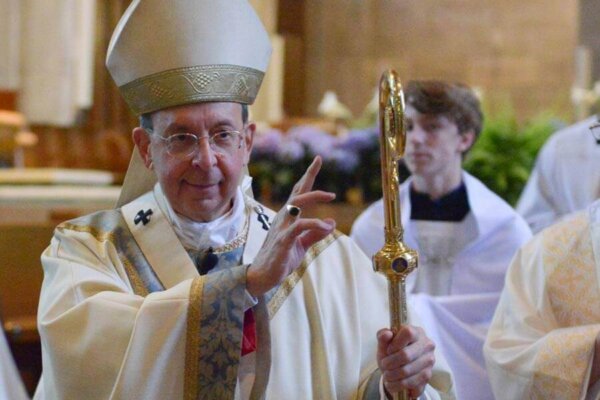Thursday 3rd Week of Advent
Catholic Center Pre-Christmas Mass and Gathering
Basilica of the Assumption
December 19, 2024
Zechariah’s Question
I have to admit it, I’m sympathetic to Zechariah. If the Angel Gabriel appeared to me in my chapel and told me that in my advancing years I’d be starting a family, I too would have some questions, and so would you! But when Zechariah protested to Gabriel that he and Elizabeth were well beyond their child-bearing years, Gabriel didn’t take it too well – he seemed impatient, even petulant. If someday an angel appears to you, and in the middle of the conversation announces, “I am Gabriel!”, know that your conversation with him isn’t going so well.
That said, it seems as though Zechariah was held to an impossibly high standard. After all, he asked a perfectly normal and natural question, the same question you and I would ask if we were in his shoes. But because he doubted, he temporarily lost his ability to speak. What must Elizabeth have thought when Zechariah came home in that condition? Did she understand what had happened, and if so, did she gently remind Zechariah that they had been praying for a child? Did she also remind him that they were among the remnant of Israel who were full of expectation that God would soon fulfill his promise to deliver his people from their sins? Zachariah was a priest, a man of faith, a pillar of the remnant of Israel. Perhaps that is why Gabriel held Zechariah to such a high standard and asked him to accept as true what was humanly impossible.
Mary’s Question
Contrast Zechariah’s question with Mary’s question. Gabriel’s announcement to Mary was far more stunning than his announcement to Zechariah, namely, that she would become the Mother of God while remaining a virgin. Mary asked, “How can this be?”
This time, Gabriel elaborates but without explaining away the mystery. What was different? Like Zechariah, Mary was asked to assent to the humanly impossible. She questions but immediately gives her wholehearted assent. Gabriel, I think, found in Mary’s soul “faith seeking understanding.” Mary asked because she believed. Zechariah asked because he could not believe.
Elizabeth knew the difference. When Mary appeared at her doorstep, she said of her: “Blessed is she who trusted that the Lord’s words to her would be fulfilled.” Zachariah would believe only after Elizabeth was with child. But believe he did and left us a beautiful canticle that sings of God’s fidelity to his promises, of which his son, John the Baptist, would be the final prophet.
Upshot
“Very interesting,” you might be saying to yourself long about now, “but what does this have to do with me and with my daily work at AOB?” After all, it’s unlikely that Gabriel will appear to me, nor will I be asked to play a unique role in the history of salvation like that of Zechariah, Elizabeth, and Mary.
That is true. But isn’t it also true that the quality of our faith and trust is tested every day? The Church we love and for which we labor is confronted, time and again, with situations, dilemmas, challenges, that seem insoluble, intractable, beyond our human capacities to solve, heal, and surmount. Think of the challenges we have been through this past year, challenges that will spill over in the year to come. Think of the nettlesome things that land on your desk or that you encounter when you are “in the field” – resistance, both active and passive, complications, big and small, that stand in the way of mission.
These things are more than annoyances; they are Gabriel standing before us. God communicates with us through the things we’d rather not deal with. And he is holding us to a high standard, as if to say, “Well, you’re a believer! You’re a person of hope. You spend your days working for a divine institution with a human face. Yet you ask, ‘How can this be? How will I get through this or that?’” When we ask God questions, as all of us do, we need first to ask ourselves whether we are asking in the spirit of Zechariah or Mary. Are we asking because we doubt? Or because we believe? Do we believe and hope when it seems as though God is asking us to do what otherwise seems humanly impossible?
A Love That Believes, Hopes, Endures
Assenting to what seems humanly impossible, going the extra mile when the road has already been long – all of this becomes possible when, at Christmas, we peer into the creche and see the Word made flesh lying in a manger, the very One we receive in Holy Communion. At that moment, may our hearts be filled with that love which ‘bears all things, believes all things, hopes all things, endures all things.’
Thank you for your dedication and love. Merry Christmas!


